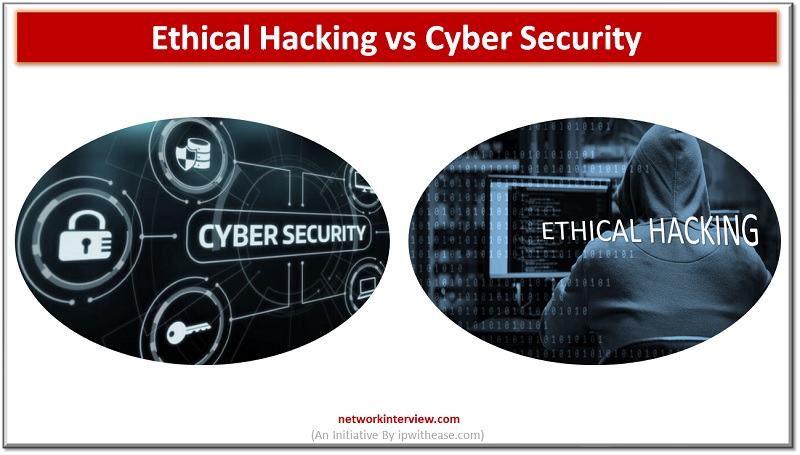
Ethical Hacking vs Cyber Security: 6 Key Differences
Ethical Hacking and cyber security are two concepts we often remain confused about. To get a basic idea of the difference between ethical hacking and cyber security, remember that both terms have the same goal: to keep data safe. The importance of data security is a concern for all. Let’s talk about how the roles of cybersecurity and ethical hacking differ in 6 key notes.
Ethical Hacking vs Cyber Security
1. Job role
A cybersecurity expert’s main job is to do regular checks and find places where systems aren’t working as well as they could. A cybersecurity expert must use the most effective technology to improve the security system. Professionals in cybersecurity should keep the security system up to date by maintaining it daily. For better system security, the cybersecurity expert should give people the right permissions to enter the system.
- Cybersecurity experts must explain what will happen if an attack harms the company.
- A cybersecurity expert’s job is to develop many ways to strengthen the security system.
- Professionals must look for bugs and risks in both hardware and software. Their job is to handle and monitor any attacks and intrusions. The experts have to find a possible threat or attempt at a breach and fix the security hole. Firewalls are built into the way networks work.
- Ethical hackers check how well a system works by looking for different security holes.
- The specialist must check the business’s safety system and suggest ways to improve it.
- Pen tests should be done regularly on the system, web app, and network to see if ethical hackers can get past the security. When ethical hackers find security holes, they should write reports about them and leave comments once the problems have been fixed.
- Ethical hackers must tell the company how the attack could hurt its users and processes.
- Ethical hackers should use hacking tools to suggest ways to fix problems with the system. Providing the right role to the right employee is crucial to avoid disengagement or isolation of employees.
2. Objectives
Cybersecurity is keeping private data on the Internet and gadgets safe from being stolen, deleted, or accessed by people who aren’t supposed to. With cyber security, you can keep your information, systems, and gadgets safe from people who want to get into them. Ethical hacking aims to make a system or network safer by fixing bugs found during tests. Ethical hackers use the same methods and tools as cyber attackers but only do so with the verified user’s permission to make systems safer and stop attacks from unfriendly users.
3. Methods
IoT (Internet of Things) security, network security, cloud security, application security, and critical infrastructure security are all parts of cyber security. These techniques can help keep computers, networks, and other devices safe. Ethical hacking includes phishing, sniffing, social engineering, inserting SQL data, hijacking, leaving footprints, listing, and cryptography. Ethical hackers can use these hacking techniques to make systems and networks safer. If you want to protect systems, these methods work better when used by a skilled hacker. They are also more reliable and protect networks and systems with the newest security features.
4. Work Intention
A cyber security expert’s job is to defend the system from attacks. It’s a job of defence. An expert ethical hacker’s main goal at work is to attack, meaning they focus on how to flood the system with attacks. This is an offensive job.
5. Process
Cyber security analysts can do their jobs better when they have a clear plan to follow. They need to:
- Identify assets.
- Protect assets.
- Monitor systems.
- Respond to incidents.
- Continuously improve.
Ethical hackers need a lot of knowledge and experience to find all the flaws and use them to their full potential. Here are the steps that make up the ethical hacking process:
- Gathering information
- Scanning and testing the system
- Gaining access legitimately
- Maintaining access
- Covering tracks
6. Responsibilities
As a cybersecurity expert, one of your jobs is to keep the system safe by setting up resources, access controls, and rights. By finding oddities and making notes of breaks, problems can be found. By examining trends, current needs, and future needs, ensures that security measures are in place.
Ethical hackers talk about current security system and look into the company’s system, network structure, and possible entry points. They also do several penetration tests on the system and find and write down security holes and breaches.
Conclusion
Ethical hacking is finding security holes that others can use before hackers do. Cybersecurity, on the other hand, is about lowering risks through different security methods. Both of these reasons are related to data privacy concerns. There are more dangers and attacks on data online than ever, making cybersecurity and ethical hacking more important.
Continue Reading:
How to make a career in Cybersecurity or Ethical hacking?
What is difference between Encryption and Hashing?
Tag:comparison, Security



